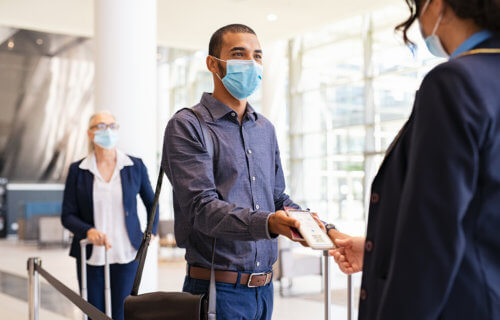BANGOR, United Kingdom — Researchers are calling attempts to keep COVID-19 out of the United Kingdom by testing people at airports during lockdown a complete “failure.” The new report reveals that almost every flight arriving at three U.K. airports during this period of COVID restrictions had the virus in their wastewater.
Study authors from the Bangor University add that the virus was also prevalent in the wastewater at airport arrival terminals. The Bangor scientists, who pioneered the use of wastewater testing to track SARS-CoV2 throughout Great Britain, wanted to find out whether the technique could serve as a way of monitoring the general health of passengers on flights coming into the country in the future.
The study, published in the journal PLOS Global Public Health, received its funding from the U.K.’s Health Security Agency.
Study authors tested toilet tank water coming from both short and long flights entering Heathrow, Edinburgh, and Bristol airports over a three-week period between March 8th and March 31st, 2022. They also collected samples from sewers in the arrival halls of each airport as well as the wastewater treatment plant near each facility.
The United Kingdom lifted COVID restrictions on March 18th, 2022. The country removed the requirement for unvaccinated passengers to take a pre-departure COVID test and another test two days post-arrival. Results show very little difference in the concentrations of SARS-CoV-2 in wastewater before and after that date.
“Despite all the intervention measures that the UK had in place to try to stop people with the illness getting on flights to the UK, almost every single plane we tested contained the virus, and most of the terminal sewers too. That might have been because people developed symptoms after testing negative; or were evading the system, or for some other reason. But it showed that there was essentially a failure of border control in terms of COVID surveillance,” says Professor Davey Jones of Bangor University’s School of Natural Sciences in a media release.
Prof. Jones notes that earlier research by the team may explain why. In a poll of 2,000 adults, 23 percent admitted that they previously boarded a flight back to the U.K. while feeling sick. That survey also asked respondents about their toilet habits while flying. Around one in eight (13%) taking a short flight would be willing to defecate on a plane. Even more (36%) said they would do the same on a long flight.
With that in mind, together with COVID virus shedding rates, the team estimates that if wastewater sampling takes place at airports in the future, it could detect 14 percent of SARS-CoV-2 cases entering the U.K. via air travel. Future sampling could also pick up other infections, such as Norovirus or Enterovirus, potentially giving a clearer picture of what pathogens are entering the country.
“This is about getting an overall picture to help UK health systems to be prepared, or, if possible, have an advance warning, of emerging diseases. It wouldn’t be feasible to test every flight arriving, but taking wastewater from arrivals at a single airport terminal used for long-haul arrivals may provide an estimate of diseases entering the country,” says Dr. Kata Farkas.
“At the moment we have no idea how many people come into the country carrying different diseases, partly because no one wants to be tested on the spot. Wastewater monitoring gives us a snapshot of the infectious diseases passengers may carry upon arrival.”
South West News Service writer Stephen Beech contributed to this report.

